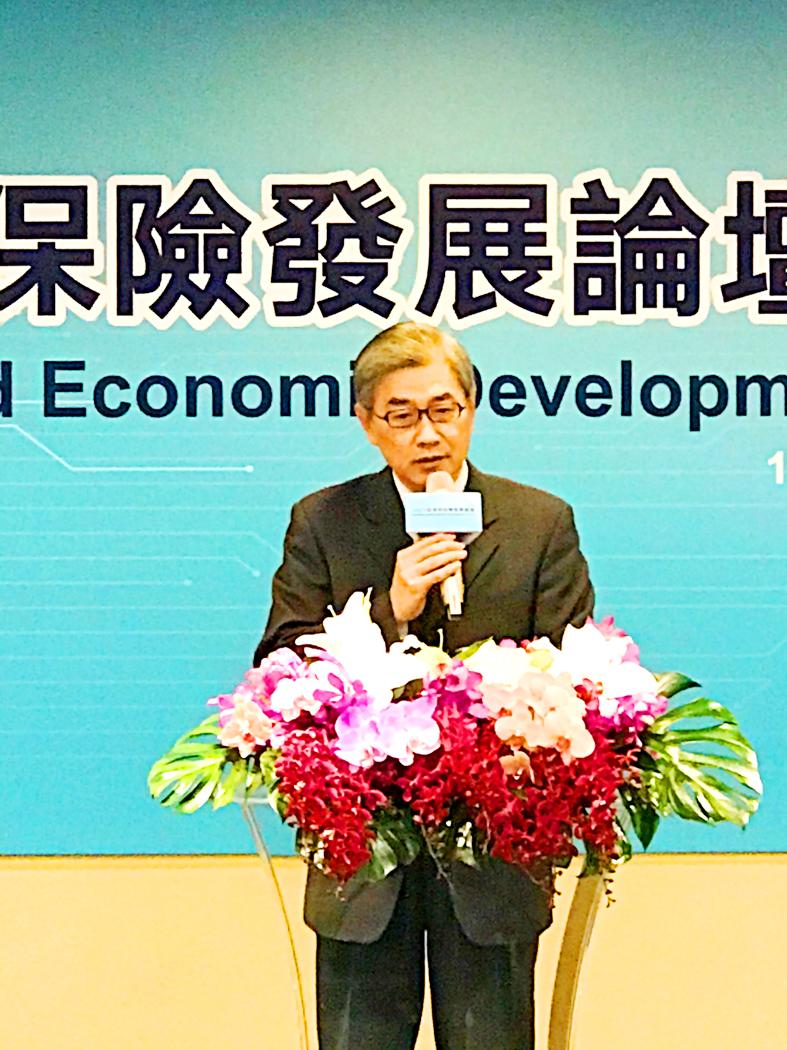The Financial Supervisory Commission (FSC) would not tolerate a protracted price war by the three Web-only banks to undercut the competition, as it would disrupt the market, FSC Chairman Thomas Huang (黃天牧) said yesterday.
That was the message he gave Chien Ming-jen (簡明仁), chairman of Rakuten International Commercial Bank Co (樂天國際商銀), the first among the three to obtain an operating license, at a private meeting on Wednesday, Huang told reporters on the sidelines of an event in Taipei.
The other two — Next Bank (將來銀行) and Line Bank (連線商業銀行) — have not submitted their applications for a license, but they are expected to file the documents next month at the earliest, the commission’s data showed.

Photo: Wu Chi-lun, Taipei Times
It is expected that Web-only banks would offer higher interest rates for deposits, lower interest rates on lending, better rewards rates or other discounts than those offered by traditional banks, in a bid to attract customers, as they have no physical branches to meet clients, Huang said.
“It is tolerable for the virtual banks to offer better rewards or prices shortly after they begin operating, but we would not allow them to make it a long-term strategy,” Huang said.
The commission hopes that the digital banks would offer innovative services or products instead of setting unreasonably low prices to attract customers to ensure solid and sustainable development, Huang said.
“It would be meaningless if they expand their business by initiating a price war,” he said.
Huang also told Rakuten about risks in information security, liquidity, risk management, compliance and corporate reputation to maintain market discipline, he added.
Rakuten International Commercial Bank, which is 51 percent owned by Japanese e-commerce company Rakuten Inc and 49 percent by IBF Financial Holdings Co (國票金控), received its operating license on Tuesday.
As virtual banks are barred from installing automatic teller machines (ATM), Rakuten plans to cooperate with traditional banks so its clients can use their ATMs for withdrawals, the commission said.
Rakuten Bank plans to offer deposits, fund transfers, small loans and debit card services in the initial phase and gradually expand into mortgages and corporate loans, Chien told reporters at a meeting in Taipei last month.
The bank aims to sign up 500,000 digital savings accounts next year, focusing on clients within the Rakuten ecosystem, such as those visiting its e-commerce site, Chien said.
After obtaining an operating license, the bank still needs to connect its information-flow and fund-flow systems with the central bank, the Central Deposit Insurance Corp (中央存保) and other agencies, he said.

Real estate agent and property developer JSL Construction & Development Co (愛山林) led the average compensation rankings among companies listed on the Taiwan Stock Exchange (TWSE) last year, while contract chipmaker Taiwan Semiconductor Manufacturing Co (TSMC, 台積電) finished 14th. JSL Construction paid its employees total average compensation of NT$4.78 million (US$159,701), down 13.5 percent from a year earlier, but still ahead of the most profitable listed tech giants, including TSMC, TWSE data showed. Last year, the average compensation (which includes salary, overtime, bonuses and allowances) paid by TSMC rose 21.6 percent to reach about NT$3.33 million, lifting its ranking by 10 notches

Popular vape brands such as Geek Bar might get more expensive in the US — if you can find them at all. Shipments of vapes from China to the US ground to a near halt last month from a year ago, official data showed, hit by US President Donald Trump’s tariffs and a crackdown on unauthorized e-cigarettes in the world’s biggest market for smoking alternatives. That includes Geek Bar, a brand of flavored vapes that is not authorized to sell in the US, but which had been widely available due to porous import controls. One retailer, who asked not to be named, because

SEASONAL WEAKNESS: The combined revenue of the top 10 foundries fell 5.4%, but rush orders and China’s subsidies partially offset slowing demand Taiwan Semiconductor Manufacturing Co (TSMC, 台積電) further solidified its dominance in the global wafer foundry business in the first quarter of this year, remaining far ahead of its closest rival, Samsung Electronics Co, TrendForce Corp (集邦科技) said yesterday. TSMC posted US$25.52 billion in sales in the January-to-March period, down 5 percent from the previous quarter, but its market share rose from 67.1 percent the previous quarter to 67.6 percent, TrendForce said in a report. While smartphone-related wafer shipments declined in the first quarter due to seasonal factors, solid demand for artificial intelligence (AI) and high-performance computing (HPC) devices and urgent TV-related orders

Prices of gasoline and diesel products at domestic fuel stations are this week to rise NT$0.2 and NT$0.3 per liter respectively, after international crude oil prices increased last week, CPC Corp, Taiwan (台灣中油) and Formosa Petrochemical Corp (台塑石化) said yesterday. International crude oil prices last week snapped a two-week losing streak as the geopolitical situation between Russia and Ukraine turned increasingly tense, CPC said in a statement. News that some oil production facilities in Alberta, Canada, were shut down due to wildfires and that US-Iran nuclear talks made no progress also helped push oil prices to a significant weekly gain, Formosa said